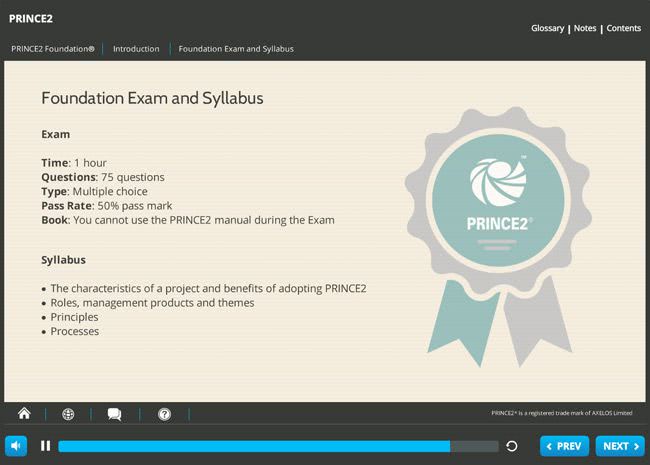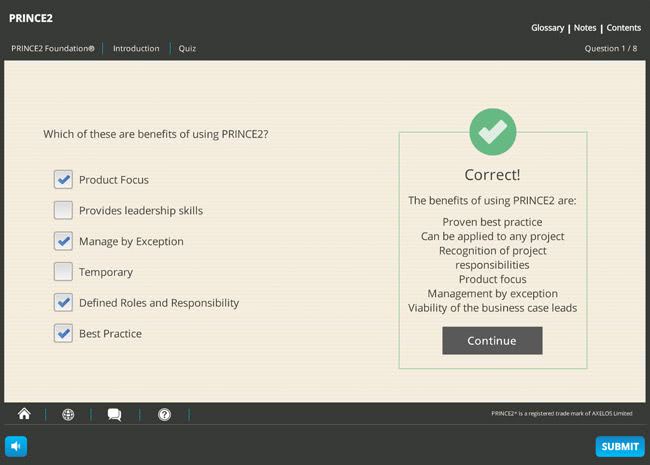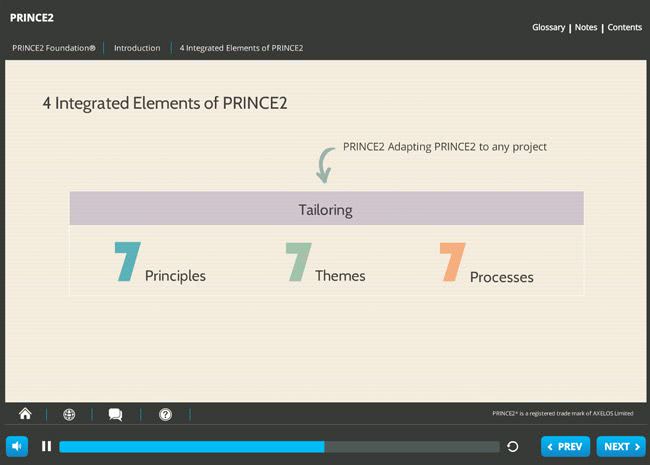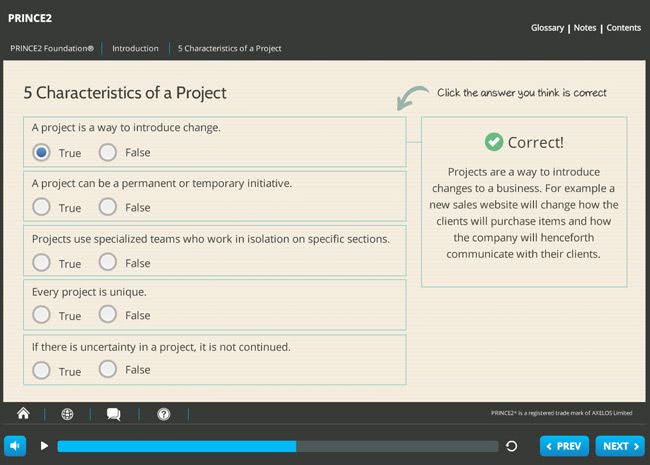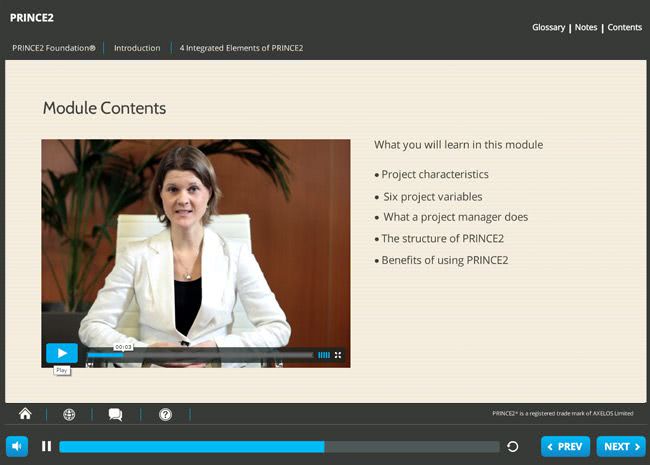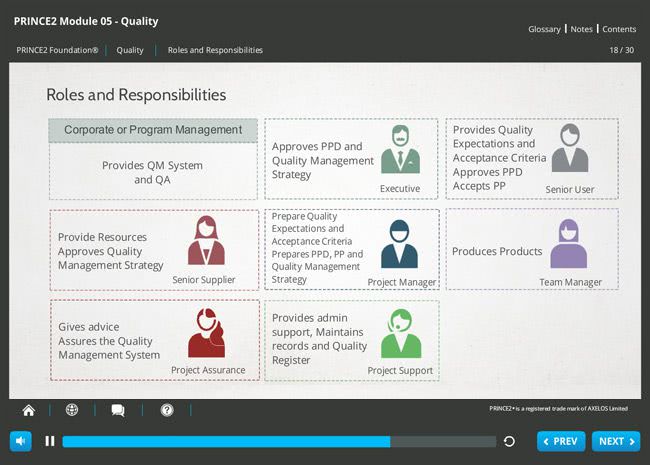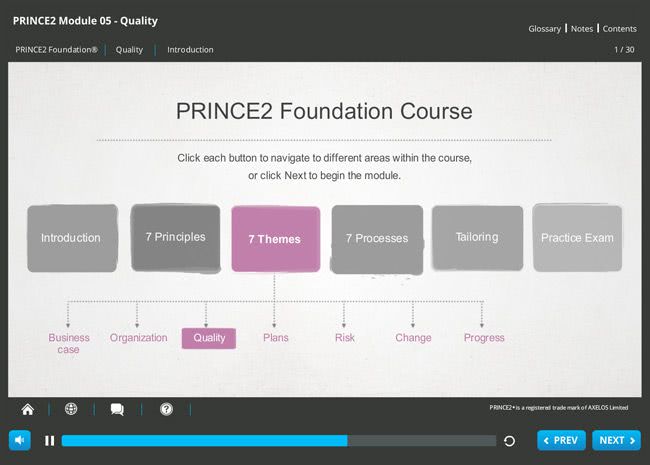Project Management:
PRINCE2® 6th Edition Foundation
6 months e-learning + exam voucher
€709 + VAT
“You
(DON’T)
have to kiss the frogs
to find your
PRINCE”
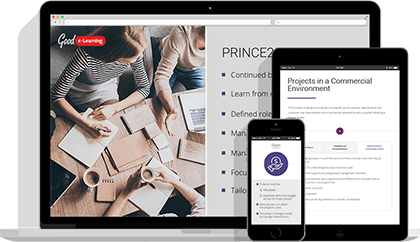
€439.00Add to cart
€439.00Add to cart
Project Management:
PRINCE2® 6th Edition Foundation
E-learning + Web-based examination
€439.00Add to cart
Key information about this course:
Price: 709 € + VAT ( 6 month E-learning + Exam Voucher)
- 12+ hours of course material included
- Fully accredited training course
- Expert tutor support
- Fully mobile compatible
- 6 months access – start today!
- FREE Exam voucher

The purpose of this PRINCE2 e-learning course is to provide individual students, groups or organizations with a good all-round basis of understanding about the PRINCE2 Method best-practice.
After completing this course you will have all you need to be able to sit the PRINCE2 Foundation Certificate in Project Management exam.
The course will also prepare you for project management in your professional life, as a member of a team that is using the PRINCE2 method, or as a member of an organization that has adopted PRINCE2.
PRINCE2 Foundation is the first of a required two-part PRINCE2 Practitioner qualification for project management professionals. It can be studied on its own or combined with PRINCE2 Practitioner e-learning.
Upon enrollment in the course you have access to the following materials:
-
-
- High quality, media-rich interactive tutorials with audio and video guidance
- Quizzes, to test your knowledge
- 2 practice (mock) exams
- Glossary of key terms and definitions
-
If you need help with your studies our PRINCE2 Tutor is on-hand to provide you with assistance via e-mail.
Prince 2 Foundation – e-learning
Course Syllabus
- Introduction to PRINCE2
- Breakdown of the course
- Lesson plan
- Benefits of this course
- Benefits of PRINCE2
By the end of the module, students should be able to recall the integrated elements of PRINCE2, including:
- Principles
- Themes
- Processes
- The Project Environment
- The definitions and characteristics of a ‘project’
- The 6 aspects of project performance to be managed
- What makes a project a ‘PRINCE2 project’
Students should also be able to describe the customer/supplier context on which PRINCE2 is based, including which considerations to take into account when undertaking projects in a commercial environment.
- Continued Business Justification
- Learn from Experience
- Defined Roles and Responsibilities
- Manage by Stages
- Manage by Exception
- Focus on Products
- Tailor to Suit the Project
By the end of the module, students should be able to recall and explain the purpose of each Principle.
- Starting up a Project (including the purpose of the ‘project brief’)
- Directing a Project (including the purpose of the ‘project initiation documentation (PID)’)
- Initiating a Project
- Controlling a Stage
- Managing Product Delivery
- Managing a Stage Boundary
- Closing a Project
Business Case – Students will be able to explain the purpose of the ‘Business Case’ Theme, including businesses cases and the benefits management approach. They should also be capable of describing PRINCE2’s minimum requirements for applying the Business Case Theme.
Finally, they will be able to define the key concepts related to business justification, as well as the differences between them, including:
- Outputs
- Outcomes
- Benefits
- Dis-benefits
Organization – Students will come to understand the purpose of the ‘Organization’ Theme, as well as the communication management approach. By the end of the section, students should be able to describe what PRINCE2 requires, as a minimum, for applying the Organization Theme.
They will also know the roles and responsibilities for the Theme (some of which may be combined), including:
- Project board
- Executive
- Senior user
- Senior supplier
- Project assurance
- Change authority
- Project manager
- Team manager
- Project support
Finally, students should be able to explain the key concepts related to the Organization Theme, including the Stakeholder and the three ‘Project Interests’ (and how they are represented within the four levels of management).
Quality – Students will be able to explain the purpose and contents of the ‘Quality’ Theme, including:
- The product description
- The project product description
- The quality management approach
- The quality register
By the end of the section, students will be able to describe PRINCE2’s minimum requirements for applying the Quality Theme. They will also be capable of explaining the key concepts related to Quality, along with the differences between them:
- Quality planning and quality control
- Project assurance and quality assurance
- Customer quality expectations and acceptance criteria
Plans – Students will be able to explain the purpose and contents of the ‘Plans’ Theme, including:
- The project plan
- The stage plan
- The exception plan
- The team plan
By the end of this section, students should be able to describe PRINCE2’s minimum requirements for applying the Plans Theme. Students will also be able to recall the steps described in the recommended approaches for planning, defining and analyzing products. Finally, students should be able to explain which factors to consider when structuring a project into management stages.
Risk – Students will be able to explain the purpose and contents of the ‘Risk’ Theme, as well as:
- A risk budget
- The risk management approach
- A risk register
By the end of this section, students will be able to describe PRINCE2’s minimum requirements for applying the Theme, as well as PRINCE2’s recommended risk management procedure. They will also be able to define the key concepts related to Risk, as well as the differences between them:
- Risks as ‘Threats’ or ‘Opportunities’
- Recommended risk response types
- Risk owners
- Risk actionees
- Causes, events and effects
- Risk probability
- Risk impact
- Risk proximity
Change – Students will learn to explain the purpose of the ‘Change’ Theme, including the purpose of:
- Change budget
- Change control approach
- Configuration item record
- Issue register
- Issue report
- Product status account
By the end of the section, students will be able to describe PRINCE2’s minimum requirements for applying the Change Theme. They will also be able to describe the types of issues associated with the Theme, as well as the recommended issue and change control procedure.
Progress – Students will be able to explain the purpose of the ‘Progress’ Theme, as well as:
- The daily log
- Lessons log
- Lessons report
- Work package
- End-stage report
- End project report
- Checkpoint report
- Highlight report
- Exception report
By the end of the section, students will be able to describe PRINCE2’s minimum requirements for applying the Progress Theme. They will also be able to explain key concepts relating to Progress, including:
- Event-driven and time-driven controls
- Tolerances and exceptions (including how tolerances are set and exceptions are reported)
This module looks at the PRINCE2 practice of ‘Tailoring’. Students will learn about:
- Which aspects of a project can be tailored
- Who is responsible
- How tailoring decisions are documented
Here, we offer students the chance to put into practice what they have learned so far. These exams are designed to simulate the official PRINCE2 Foundation examination and offer students the questions with rationale to review the key points covered.
When you feel you are ready to sit the exam, simply contact Good e-Learning to request your FREE exam voucher.
Here, we offer students the chance to put into practice what they have learned so far. These exams are designed to simulate the official PRINCE2 Foundation examination and offer students the questions with rationale to review the key points covered.
When you feel you are ready to sit the exam, simply contact Good e-Learning to request your FREE exam voucher.
Exam / Assessment
This course is designed to fully prepare candidates to sit both the PRINCE2 Foundation examination.
You can take the exam online (virtually) using a service provided by PeopleCert.
Both the Foundation and Practitioner sections of the course feature mock exams to help candidates prepare for the real thing. Once you feel you are ready to sit an exam, please contact us to request a FREE exam voucher. Candidates can receive one free voucher per-exam.
Before booking your exam, it will be a good idea to make sure that your device meets the technical requirements. You can do so via this online test. This test will examine the suitability of your webcam, microphone and internet connection. Please visit the PeopleCert website for more information and guidance.
- PRINCE2 Foundation (or higher). This applies only to certificates obtained after 1 January 2009
- Project Management Professional (PMP)
- Certified Associate in Project Management (CAPM)
- IPMA Level A® (Certified Projects Director)
- IPMA Level B® (Certified Senior Project Manager)
- IPMA Level C® (Certified Project Manager)
- IPMA Level D® (Certified Project Management Associate)
- Closed book
- All questions are multiple choice
- There are 60 questions per paper (each worth one mark)
- 33 marks are required to pass (55%)
- Candidates will have one hour (60 minutes) to complete the exam
Accredited PRINCE2® 6th Edition Foundation training is provided by Good e-learning, accredited by PeopleCert.

